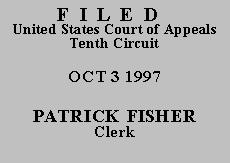

| BOB M. GUNN,
Plaintiff-Appellant, v. JOHN J. CALLAHAN, Acting Commissioner, Social Security Administration,(*) Defendant-Appellee. |
|
Plaintiff Bob M. Gunn appeals from a decision of the magistrate judge(1) that affirmed the denial of his claim for social security disability benefits. He challenges, as not supported by substantial evidence, the following findings of the Administrative Law Judge (ALJ): (1) that plaintiff did not have a severe mental impairment during any twelve-month period covered by this claim--contending the ALJ failed to link his conclusions on the psychiatric review technique form with the supporting evidence; and (2) that plaintiff retained the residual functional capacity to perform a significant number of jobs other than his past relevant work--because the ALJ did not call a vocational expert. We review the Secretary's decision on the whole record to determine only whether it is supported by substantial evidence and the correct legal standards were applied. See Goatcher v. United States Dep't of Health & Human Servs. 52 F.3d 288, 289 (10th Cir. 1995). We affirm.
Plaintiff, while working as a manager at a Radio Shack store, was severely injured on August 10, 1991, when he was shot five times during an armed robbery. Plaintiff did not begin working again until June 21, 1993. He claims a closed period of disability from August 10, 1991, through June 20, 1993.
After a hearing, the ALJ determined at step five of the evaluation process, see Williams v. Bowen, 844 F.2d 748, 750-52 (10th Cir. 1988), that plaintiff was not disabled. The ALJ's decision reviewed the medical evidence. It pointed out that plaintiff's treating physician, Dr. James Lockhart, released plaintiff in January 1992, saying plaintiff was "normal" and had achieved maximum medical improvement. See II R. 19-20, 299. The ALJ also considered the opinion of Dr. Harold Goldman, the medical expert who reviewed plaintiff's medical records and testified at the hearing. Dr. Goldman stated that beginning six months after he was shot, plaintiff was not restricted in any activities such as standing, walking, sitting, or lifting; that the residual effects from his injuries would not decrease plaintiff's residual functional capacity; and that "nothing in the record" indicated any continuing impairment of social concentration or decompensation in work or work-like settings. See id. at 21-22, 97, 280. The ALJ further pointed out that less than one year after the robbery Dr. Thomas Donica, a psychiatrist, "assessed a '0' percent partial impairment due to mental and behavioral disorders." Id. at 21, 312. Dr. Donica gave an opinion that, from a psychiatric point of view, plaintiff could do any type of work except retail sales. See id. at 312. On appeal, the magistrate judge affirmed after thoroughly reviewing the medical evidence.
We have carefully reviewed the briefs and the record and are satisfied that the district court accurately summarized the facts and correctly applied the law. Although we sympathize with plaintiff's unfortunate situation and note that there is conflicting evidence in the record, we are unpersuaded by plaintiff's claims of error. We therefore affirm for substantially the reasons stated in the magistrate judge's order filed September 23, 1996.
AFFIRMED.
Entered for the Court
Circuit Judge
*. Effective March 31, 1995, the functions of the Secretary of Health and Human Services in social security cases were transferred to the Commissioner of Social Security. P.L. No. 103-296. Pursuant to Fed. R. App. P. 43(c), John J. Callahan, Acting Commissioner of Social Security, is substituted for Donna E. Shalala, Secretary of Health and Human Services, as the defendant in this action. Although we have substituted the Commissioner for the Secretary in this caption, in the text we continue to refer to the Secretary because she was the appropriate party at the time of the underlying decision.
**. This order and judgment is not binding precedent, except under the doctrines of law of the case, res judicata, and collateral estoppel. The court generally disfavors the citation of orders and judgments; nevertheless, an order and judgment may be cited under the terms and conditions of 10th Cir. R. 36.3.
1. The parties consented to disposition by the magistrate judge. See 28 U.S.C. § 636(c).